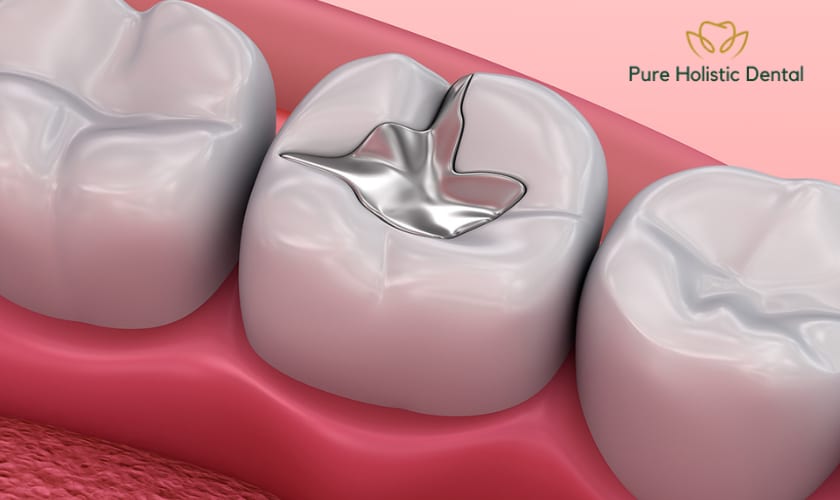Many people are concerned about the health effects of mercury in dental fillings. They want to know if it’s safe to put a mercury-alloy filling into their mouth. Knowing how mercury affects the body is vital if you’re thinking about having dental work done.
Why You Should Stay Away From Mercury Fillings?
The reasons to stay away from mercury fillings are multiple. However, it is possible to narrow them down to 4 reasons. Here they are:
Mercury Amalgams Can Leak Into Your Body
Mercury amalgam is a very popular dental filling material. It can be used in the treatment of wisdom tooth extraction, root canal therapy, and other dental procedures. Dental fillings are typically made up of 50% amalgam and 50% composite resins. The amalgam is made up of over 95% elemental mercury, which is a neurotoxin that can cause a variety of health problems if ingested or inhaled. These include damage to the central nervous system, damage to the kidneys and immune system, as well as reproductive and developmental problems in both men and women.
It leaks into your body when there is a hole or other damage in your teeth that allows the mercury to escape into the tissue surrounding it; this can lead to an infection at this site. If you have an infected tooth, then you may have trouble chewing food properly or swallowing on one side only. This will require a mercury removal treatment to properly replace the damaged fillings without exposing the patient even more.
Damage To The Nervous System
Mercury can get into your bloodstream through inhalation or ingestion, but it also can enter your body through skin contact with mercury-containing products. Once it enters your body, it can change into an organic form called methylmercury. This form is highly toxic and can cause neurological damage, especially if you ingest high doses over time. The symptoms of mercury poisoning include tremors, slurred speech, numbness, and tingling in the hands and feet, balance problems (both walking and standing), memory loss, depression, and psychosis.
Create Other Health Problems
Many of the people who have mercury fillings have other health problems. They are more likely to have kidney disease, heart disease, thyroid disease, and many other conditions. The reason for this is that the mercury in the fillings can damage the body’s immune system. If you have mercury fillings in your teeth and you get sick, it’s likely because your immune system was affected by these toxins. The more damage to your immune system, the more likely you are to get sick.
Some of these diseases include:
Kidney Disease – This is an autoimmune condition that affects your kidneys and causes them to fail over time. It causes scarring of the tissues in your kidneys which can lead to kidney failure if left untreated.
Heart Disease – Heart disease is a term used to describe a number of different conditions that affect how blood flows through the heart muscle. Heart attacks are caused by atherosclerosis (also known as hardening of the arteries), which can occur over time as well as being caused by smoking cigarettes or eating foods high in fat and cholesterol. This can lead to clogged arteries which eventually block off blood flow
Allergic Reactions To Mercury
This is because mercury is a toxic metal that can interact with your body’s cells and cause them to become inflamed. This inflammation can lead to a number of different health problems, including autoimmune diseases like lupus, rheumatoid arthritis, and multiple sclerosis (MS).
If you have an allergic reaction to mercury fillings, you’ll experience symptoms like rash, hives, itching, and swelling that don’t go away. If it’s severe enough to warrant medical attention, you might also experience stomach cramps, nausea or vomiting, dizziness or lightheadedness, fatigue, and muscle pain.
Mercury fillings are most commonly found in older adults who have had many dental procedures over the course of their lives—including wisdom teeth extraction (filling), root canal treatment, and crowns—which means they’re at higher risk for developing an allergy to the metal than younger people are.
Consult A Dentist In case Of Problems With Your Mercury Fillings
There are a number of reasons to get this checked out by your dentist:
- You could experience pain or sensitivity in the area.
- You might feel like there’s a strong taste in your mouth.
- You could have more frequent headaches than usual.
It’s true that some dentists don’t know how to properly clean mercury-based fillings which can cause more harm than good. But if the dentist doesn’t know how to do it correctly, then they won’t be doing it at all! It’s important to find a dentist who is knowledgeable about how to clean these fillings safely so that you don’t end up hurting yourself or developing an infection.
The Bottom Line
If you have mercury fillings in your mouth, it’s probably best to get them removed. Much of the proven scientific literature on the subject recommends that they be removed while your teeth are still in their natural state and before they reach a point of being impacted by excess dental plaque. This is because the surface of the tooth is more vulnerable to an attack by microbes before it has become hardened through plaque development, so waiting until it becomes harder is simply a matter of protecting the tooth.

